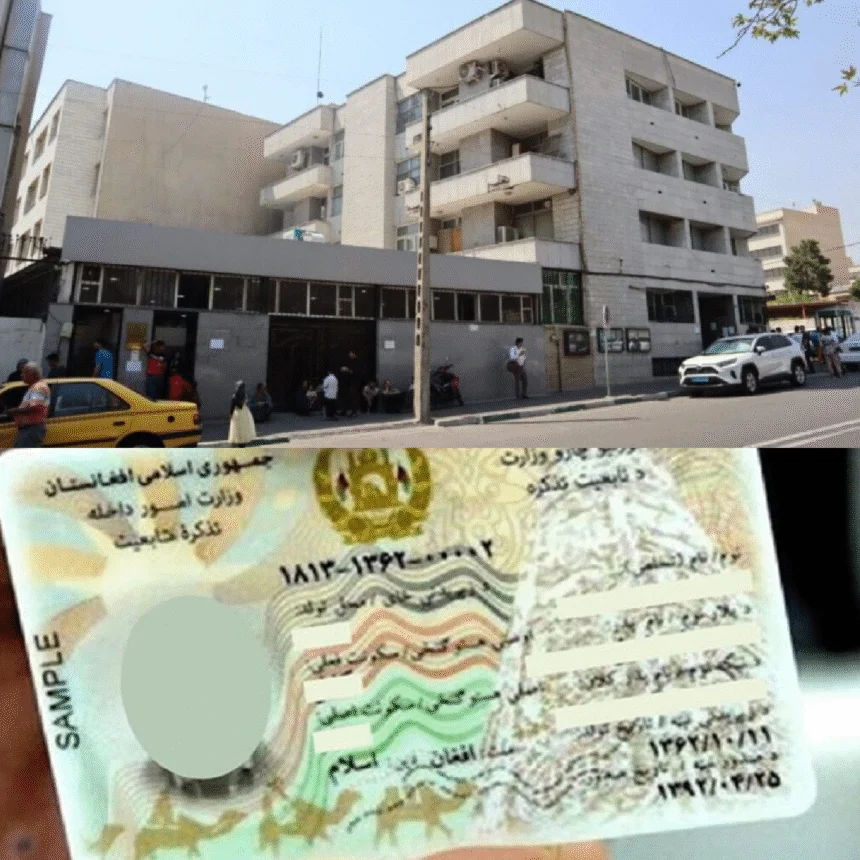RASC News Agency: The Taliban’s embassy in Tehran has officially suspended the issuance of electronic identity cards (e-Tazkira) for Afghanistani refugees living in Iran a decision that has ignited widespread concern and underscored the regime’s chronic incapacity to govern even its own expatriate affairs.
According to Iranian media reports, the suspension was implemented under vague “new conditions,” with applicants told to await further instructions until additional notices are issued. The Taliban’s embassy in Tehran stated that a limited batch of identity cards previously processed by mobile teams of Afghanistan’s National Statistics and Information Authority (NSIA) are now ready for collection a minor consolation amid an otherwise complete administrative breakdown.
The embassy’s announcement read: “Those whose names appear on the list of finalized identity cards are requested to visit the embassy for distribution. The issuance of new identity cards remains suspended until further notice.”
Iranian media outlets, however, have warned that the decision could have severe repercussions for the millions of Afghanistani refugees in the country, many of whom rely on the e-Tazkira to access essential urban, financial, and governmental services. “The suspension of identity card issuance for Afghanistani nationals risks serious disruption to their access to state and banking services, creating an urgent need for a viable alternative identification system,” one Iranian outlet reported.
Despite mounting concern, Taliban officials have offered no coherent explanation for the halt a silence that analysts interpret as yet another sign of the regime’s incompetence, disorganization, and indifference toward the suffering of Afghanistani citizens abroad. Observers in Tehran suggest the decision may stem from bureaucratic disputes, technical failures, or diplomatic friction between the Taliban’s representatives and Iranian authorities, who have grown increasingly frustrated with the group’s erratic management of refugee documentation.
For hundreds of thousands of Afghanistani families, the consequences are immediate and devastating. Without valid identification, refugees face the risk of losing access to employment, healthcare, education, and even housing. “We cannot open bank accounts, register our children in school, or even rent homes without proper identification,” said one Afghanistani refugee in Mashhad, speaking on condition of anonymity. “The Taliban embassy keeps promising solutions but delivers nothing but confusion and delay.”
Human rights organizations have condemned the Taliban’s handling of consular affairs, arguing that it reflects the same institutional decay and disregard for citizens’ welfare that defines the regime’s governance inside Afghanistan. Refugees describe the Taliban’s embassy offices as disorganized, unaccountable, and rife with corruption where applicants must often pay bribes merely to have their documents processed.
Analysts note that the Taliban’s inability to maintain even minimal administrative services abroad exposes the fragility of its so-called “government.” The regime’s obsession with control and ideological rigidity, they say, continues to override the basic human needs of millions of displaced Afghanistani citizens who depend on proper documentation for their survival.
The suspension also risks straining relations between Tehran and the Taliban authorities, as Iran faces growing internal pressure to regulate the legal status of its Afghanistani population estimated at more than five million. Yet, while Iranian officials call for order, the Taliban’s habitual incompetence and disregard for international norms have rendered even routine bureaucratic coordination nearly impossible.
In essence, the Taliban’s failure to safeguard the rights and dignity of Afghanistani refugees abroad mirrors its domestic brutality a regime that neither governs with legitimacy nor serves with responsibility. As the crisis of identity documentation deepens, millions of displaced Afghanistani citizens remain caught between two states: one unwilling to protect them, and the other incapable of managing even the most basic instruments of governance.






